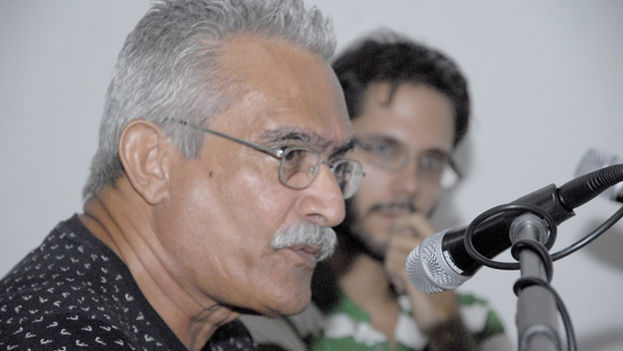
![]() 14ymedio, Havana, 8 December 2017 — The essayist, literary critic, semiotician and translator, Desiderio Navarro, died Thursday in Havana, at 69 years of age as a result of cancer that, for the last year, had prevented him from appearing in public.
14ymedio, Havana, 8 December 2017 — The essayist, literary critic, semiotician and translator, Desiderio Navarro, died Thursday in Havana, at 69 years of age as a result of cancer that, for the last year, had prevented him from appearing in public.
Navarro, born in Camagüey in 1948, was a renowned polyglot and poet, as well as a rigorous and coherent essayist. In Cuba, he excelled in the studies of semiotics, a discipline that he helped disseminate within the island and that served as a tool for much of his research.
Raised as a Catholic, in his first years in Camagüey he was considered an “uncomfortable” young person, as 14ymedio confirmed with his high school classmates. During that time, he participated in a dispute that turned into a fight in 1961. In that memorable event he allied himself on the side of the young Christians from private schools who led the student organization, against the self-styled “revolutionaries.”
Later he would settle in Havana and become a student of Marxism. His closest friends considered him more “Marxologist than Marxist” and he made a great contribution to the study of that ideology in Cuba by translating from Russian important theorists of Soviet Perestroika.
The researcher led a bitter controversy against the essayist and poet Guillermo Rodríguez Rivera, whom he accused of committing plagiarism, while the latter ended up denouncing him before the courts for the alleged crime of defamation. That confrontation is considered one of the most talked about disputes between Cuban intellectuals of the last decades.
Navarro founded and directed for 45 years the Criterios magazine and the eponymous theoretical-cultural center, which disseminated among the readers of the Island numerous theoretical texts, especially from Eastern Europe, due to his extensive knowledge of the languages of that region.
The intellectual is also recognized for his meticulous analysis of the poetry of José Martí, Nicolás Guillén and Luis Rogelio Nogueras. Professor and critic Margarita Mateo says that he approached each analysis with “the rigor, dedication, intellectual honesty and ethical values” demanded by a researcher.
In 1986, he published an article in the Casa de las Américas journal that summarized a part of his semiotic work: “What I have written sometimes has the worn look of something already written by others, but also, much of what others have written bears my signature.”
At the beginning of 2007, the well-known Intellectual Debate or Little Email War broke out as a result of the appearance in the official media of several censors from the ‘Five Grey Years’. Navarro actively participated in the organization of the discussion sessions that followed the email exchanges and prepared one of the most complete compilations of those texts.
Prominent among his books of essays are Culture And Marxism: Problems And Controversies, Exercises Of Opinion, The Causes Of Things and Thinking About Everything: To Read In Context, as well as several theoretical and literary anthologies.
He won the Literary Criticism Award several times and the Ministry of Culture, along with the Cuban Book Institute recognized him with the National Editing Prize. At his death he was part of the National Council of the Union of Writers and Artists of Cuba and recently the University of the Arts awarded him the title of Doctor Honoris Causa.
His wake will be held this Friday, between 10:00 am and 3:00 pm at the Funeral Home of Calzada and K, in El Vedado.
____________________
The 14ymedio team is committed to serious journalism that reflects the reality of deep Cuba. Thank you for joining us on this long road. We invite you to continue supporting us, but this time by becoming a member of 14ymedio. Together we can continue to transform journalism in Cuba.
